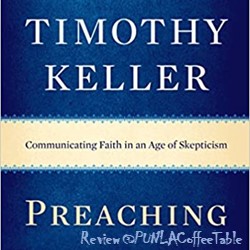Episode 23V07 – how to talk to a Skeptic (Book Review)
(written by Dr. Kip Wehrman 05/15/2023)
Hello my friends. Thanks for joining me today for an @ the PUNLA coffee table. I would like to share with you an article I read by Donald Johnson “How to Talk to the Skeptic ”. I to share this with you as a potential resource that at least some of you might be interested in.
Okay the book is titled “How to Talk to the Skeptic” by Donald Johnson. Johnson states his book is intended to address three types of questions;1) Many want to know how to respond to challenges to Christianity. They are looking for answers to tough questions, rebuttals for difficult arguments, and help in sharing the gospel with friends; 2) They want to know what to say in defense of Christianity when faced with a charge against it., 3) Other people are interested in learning how to explain their faith clearly to unbelievers. Johnson says that the book’s focus will move from the broad and philosophical to the more precise and practical. He describes that this is necessary because the philosophical provides the foundation for the practical. The book begins by discussing the nature of religion and what that means in regard to the overarching goal of evangelism. Then the book walks through the initial steps to take in framing a conversation properly. This provides framework for the key element of the book and provides an important distinguishing characteristic of Johnson’s evangelistic model.
Part 1: A Framework for Fruitful Conversations
Chapter 1 is titled “No Selling Required.” Johnson begins this chapter by saying, “When it comes to talking about your religion, skeptics will usually expect you to try to sell them something.” Most skeptics view Christians as snake-oil salesman or maybe as a shady used-car guy. Bottomline is that skeptics view Christians doing evangelism as hucksters. One reason for this is at our churches and religious gatherings we are always presented with things to join, participate in, or buy. Events, Bible studies, retreats, etc. on numerous topics like “meaning of life”, “inspiration”, “Peaceful meditation”, “Moral guidance” and on and on. We have “great worship experiences”, “fun activities for the kids”. Some Churches even offer coupons for drinks. So, while most Churches are not intentionally selling products, you can see how the skeptic sees it. This is all part of the religion as a consumer product approach to ministry. Instead, we should be focused on religion as a worldview approach to ministry.
Chapter 2 is titled “The Big Picture.” Johnson identifies the importance of establishing a topic of conversation. Many skeptics may want to engage in topical and attacks on some objection to Christianity. Johnson advises to stay focused on the “big picture.” We need to talk about which story of the universe is more reasonable to believe: Christianity, or something else? Johnson wants the focus to remain on a broad comparison of worldviews, not specific objections. The first reason to establish worldviews as the topic is to highlight the rationality and evidence for our worldview. Next, Christianity is not based on just one piece of data. The cumulative case is strong based on knowledge of everyday facts. Typically, the skeptic needs more than an answer to a specific objection. Keep the discussion focused and avoid jumping around on topics. Last by establishing worldview as the topic, you can ensure that the burden of proof is placed on both sides of the debate.
Chapter 3 is titled “The State of the Doubter’s Knowledge.” Johnson begins this chapter by quoting Bible wisdom. Be slow to speak and quick to listen. Allow the skeptic to state their position fully. No rude side comments. Just listen. Work to build a relationship with the discussions instead of animosity. By listening to the skeptic’s full argument, you have the opportunity to learn their position so you can rebuttal. Then you will have your opportunity to practice Christian apologetics.
Part 2: What Skeptics Need to Know About God
Chapter 4 is titled “Love and the Meaning of Life.” Johnson describes how a typical skeptic views Christianity. The views include “God is an egomaniac”, “silly arbitrary rules”, “what’s with the rituals”, etc. As a listener, we need to be thinking of how to explain God’s desire of worship and sacrifice, the nature of love, and the meaning of life. Then explain how we learn to love, why we need redemption, etc.
Chapter 5 is titled “The Reason for the Rules.” Johnson starts chapter 5 by cautioning us about mishandling the rules. What he means is focusing on the law of the Bible without concentrating on the character of God. Unfortunately using commandments as a checklist for righteousness is very common among believers. It is easy to see why the skeptics misunderstand what we me we mean when we say ‘law’. Churches often add more extra-biblical rules. Christians should resist redefining the rules. Johnson then describes what he calls the parental approach to the rules. He talks about how as parents we want our rules to be interpersonal relationship rules. Johnson ends this chapter with a recap of why God gave us rules and the purpose.
Chapter 6 is titled “What Jesus Meant by That Whole “Born Again” Thing.” In this chapter Johnson talks about the concept of the “onetime legal transaction”, and the major obstacle to the skeptic believing. Unbelievers simply can’t abide by the notion of when salvation comes. The “God doesn’t care what kind of person you are” is hard for the skeptic to understand. Johnson then pivots to discussion about a pattern for building a family and dealing with sin, along with discussions about creation, the fall, the flood, Moses, and how these all relate to Jesus. He concludes this chapter by saying, “ salvation is not only from sin, but for sonship in Christ.”
Chapter 7 is titled “Why Hell Is Fair and Heaven Won’t Be Boring.” Johnson begins this chapter with a discussion about reconciling hell and a loving God. Then Johnson asks and answers two questions, “is focusing on heaven detrimental to life on earth?” and “is heaven going to be boring?” He concludes that Christians should try to convey truth about the afterlife.
Chapter 8 is titled “How to Think About the Bible.” Johnson begins this chapter by poking a little fun at Dan Brown (the author of DaVinci Code). The Bible is not a fax from heaven. The Bible is often misunderstood and claims about the scope and divine nature are difficult for skeptics. Johnson ends this chapter by saying, “The goal of evangelism is not to get people to accept the Bible as true or inerrant or even the Word of God, although I am convinced that Scripture is all of those. The goal of evangelism is to get people to know God.”
Part 3: Dealing with the Data
Chapter 9 is titled “The God Hypothesis.” This chapter begins the discussion about comparing and evaluating worldviews. Worldview evaluation should test the explanatory power of a worldview, as well as meeting criteria about coherence and factual adequacy. Johnson advocates making a list of the indisputable facts then the reviewing the skeptic’s data.
Chapter 10 is titled “Christianity and Pagan Myths.” Johnson talks us through the way to address the “myth of Jesus.” The Christian worldview has nothing to fear from these arguments. The Christian worldview teaches the difference between myths and an objective encounter with the creator of the universe, God.
Chapter 11 is titled “The World Is Not Enough.” Johnson begins this chapter by asking the age old question, ”is this all there is?” Then Johnson walks through ways to address this issue from the Christian Worldview. He concludes that the Christian worldview is the only one that treats our desire for transcendence as real.
Chapter 12 is titled “Up Close and Personal with God.” In this chapter Johnson describes the paradox of evidence for personal experiences with God and how to address this with a skeptic.
Chapter 13 is titled “Hypocrisy, Sex, and Other Causes of Skepticism.” Johnson includes a batch of skeptic’s objections to the Christian worldview. He addresses Christians behaving badly, heartbreak, fatherlessness, social pressures, the cost of discipleship and immorality. He talks about how we interpret experiences in light of things we gleaned from sources and other experiences.
Chapter 14 is titled “Telling the World Its Story.” Johnson begins his last chapter by saying that” I opened this book by saying that religious skepticism is on the rise. However, as we have seen, this is not primarily due to the intellectual power or persuasive energy of any anti-Christian worldview.” People are searching for their story. They long to make sense of the world and find a reason for hope. We have truth that people are looking for. God has provided us the amazing opportunity and we must take advantage of it. He ends with a prayer, “ My prayers is that you are now better equipped to do it.”
I personally really like this book. If you are looking for a book which will help you build techniques and arguments for engaging the skeptic, this is a good resource for you.
Until next time @ the PUNLA Coffee Table. God bless.


